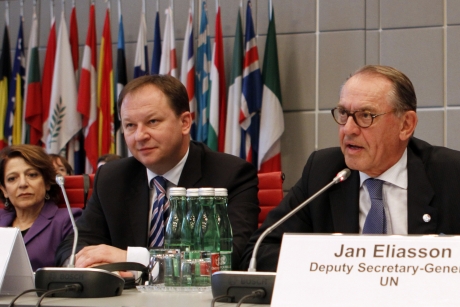OSCE Special Representative, at conference in Vienna, links inequality, globalization and trafficking
The OSCE Special Representative and Co-ordinator for Combating Trafficking in Human Beings, Maria Grazia Giammarinaro, discussed financial, social and legal factors related to migration, inequality and trafficking at an OSCE-hosted conference on preventing modern-day slavery.

OSCE Special Representative and Co-ordinator for Combating Trafficking in Human Beings, Maria Grazia Giammarinaro, Ambassador Ihor Prokopchuk, Chairperson of the OSCE Permanent Council and Jan Eliasson, UN Deputy Secretary-General at the opening session of the Alliance against Trafficking in Persons conference, Vienna, 25 June 2013.
“Globalization has brought about many important innovations, but it has also increased inequalities,” Giammarinaro said. “During and discussions we will, in particular, focus on inequalities linked with migration and the labour market, that lead to gross violations of people’s rights and increase their vulnerabilities to trafficking.”
The 13th Alliance against Trafficking in Persons Conference brings together more than 300 senior government officials, national anti-trafficking co-ordinators and rapporteurs, representatives from international and non-governmental organizations, law enforcement agencies and trade unions, as well as employers’ organizations and migrants’ rights groups. Special guests include Jan Eliasson, Deputy Secretary-General of the United Nations, Yury Fedotov, Executive Director of the UN Office on Drugs and Crime, Laura Thompson, Deputy Director General of the International Organization for Migration,Sergey Lebedev, Chair of the Commonwealth of Independent States Executive Committee, and Ihor Prokopchuk, Chairperson of the OSCE Permanent Council.
The increasing use of unpaid work to foster the illicit accumulation of wealth, which is at the core of contemporary slavery, will be one of the key topics of the event. The discussion will also shed light on the economic and social costs of contemporary slavery, which are related to corruption, massive tax evasion, disruption of healthy businesses, economic and social instability, and the erosion of the rule of law.
“The agenda of this conference reflects the ability and courage of the OSCE, in co-operation with its Alliance partners, to tackle the most difficult, unexplored, and conceptual sides of modern-day slavery, those that pose a real challenge to the anti-trafficking policies of the participating States,” Lamberto Zannier, OSCE Secretary General, said in his welcoming speech.
Teresa Morais, Portuguese Secretary of State for Parliamentary Affairs and Equality, Douglas Wake, Deputy Director of the OSCE Office for Democratic Institutions and Human Rights, and Moussa Oumarou, Director of the Governance and Tripartism Department of the International Labour Organization are also among the high-level speakers at the conference.
The Alliance against Trafficking in Persons is a broad international forum initiated by the OSCE. It brings together regional, international and intergovernmental, as well as non-governmental organizations, to jointly prevent and combat human trafficking.
Source: Organization for Security and Co-operation in Europe
- 363 reads
Human Rights
Ringing FOWPAL’s Peace Bell for the World:Nobel Peace Prize Laureates’ Visions and Actions

Protecting the World’s Cultural Diversity for a Sustainable Future

The Peace Bell Resonates at the 27th Eurasian Economic Summit

Declaration of World Day of the Power of Hope Endorsed by People in 158 Nations

Puppet Show I International Friendship Day 2020

